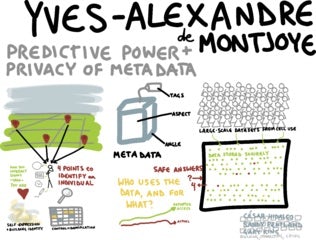Is privacy really a topic?
I had the pleasure to host a gathering of Brussels Legal Hackers in Flanders Arts Institute last night. It was relevant to welcome them in our house for two reasons: on the one hand, I am managing a quite large database with a lot of personal data, and I wanted to learn how the upcoming GDPR is going to impact my job. On the other hand, Flanders Arts Institute also has a social-artistic leg, and I think that privacy is a topic that deserves some attention.
The GDPR, or General Data Protection Regulation, will impact practically all organizations, big and small beginning May 2018, because it revises how organizations can deal with personal data. And since practically everything can be personal data (heard of the “four datapoints away from anonymity” by demontjoye.com?)

In any case, I learned yesterday that a data controller can claim public interest as a legitimate base for collecting personal data. Since Flanders Arts Institute has a mission to provide the Flemish government with an overview of the cultural sector, I believe that our data activities can be covered by this. This is a big relief, if it turns out to be correct. I will certainly need to get this confirmed. In other scenarios, it might have been necessary to collect “consent” from the individuals in our database, which has a huge organisational burden.
A second lightbulb moment in the session was the comment that society in general is not having an in-depth privacy discussion. Apart from the absence of the discussion, it also turns out that there are many misconceptions and a lack of understandable information. Apparently, the commission is thinking of providing “icons” to make it easier to understand what is happening to your data. Whether or not this is a good idea, is a good question.
Linking the latter point to the cultural sector, I was wondering if there are any social-artistic projects that are bringing privacy in the spotlight? Are there theatre productions that deal with privacy? Are there songs about privacy? Is there a visual artist that reflects on privacy and incorporates these reflections in his or her art? Perhaps my colleague Sofie Joye knows about some projects?
UPDATE 29/03/2017 —Seda Guerses, currently associated to constant vzw, mails:
Many artists have taken up the topic of privacy, and some have looked at data protection (two overlapping but different topics). Manu Luksch was one of the first people to connect it specifically to data protection with her project “faceless”. The project also inaugurated the Manifesto for CCTV Filmmakers. Many projects on privacy often fall under the category of surveillance art, again a different concept with overlaps to privacy. With about a 10 year delay the topic has definitely hit mainstream US arts venues like the Whitney (exhibition of Laura Poitras), and some more radical ones, like Artists Space (exhibiting Hito Steyerl on circulation of images/film/surveillance), and the recently reopened International Center of Photography’s premier exhibition on Public, Private Secret. My impression in Europe is that attention to the topic has been dealt with for a longer period of time, most prominently in venues dedicated to media and art: Transmediale, Prix Arts Electronica, ZKM, and thanks to arts and culture initiatives like Constant (Belgium), ESC (Austria), Bootlab (Berlin) and educational institutions like the Piet Zwart Institute and Institute of Network Cultures.
Various articles have been written on the topic, and there are also various online exhibits/compilation, see for example here artandsurveillance.com). The Conference of Computers, Privacy and Data Protection (CPDP) that takes place in January every year in Brussels has also established a tradition of having an exhibition where they bring together artists and activists working on the topic.
As for my collaboration with Constant: we have looked at privacy issues together before and it has been a fascinating journey. In our current collaborations we are focusing much more on how current production of software and digital systems (and the rise of the “cloud”) are impacting institutions and our work, culture, everyday grammars of action. “Clouds are not an option” was one of the outcomes of that collaboration, and an upcoming event titled “Software Observatory” is the next one. An important element of the work at Constant is to understand and intervene in the way developments (and failures) in technology are transforming cultural and arts organizations.
UPDATE 30/03/2017 — Bart Magnus points me to:
This project of Thomas Bellinck:
Simple as ABC #2: Keep Calm & Validate is a documentary musical theatre performance about the digitization of migration management and the outsourcing of our unease about social sorting. For this second part Bellinck strikes up many different conversations with border and data managers in the control rooms and at the liquid fringes of Project Europe.
UPDATE 04/04/2017 — Het werk van Rachida Lamrabet
The Royal Flemish Theatre has a running “Privacy Project” in which Rachida Lamrabet has a currently debated project in which people can talk five minutes around the question “ What does privacy mean to you in the digital age?
The results will be presented in different formats by a network of theaters between January 2017 and June 2018. These performances, staged readings, and community forums will create an artistic and cultural dialogue centered around varying American and European understandings of privacy. 6 of the video-plays will be presented as an expo.
kvs.be/en/deburkanisation
Right now, Rachida is catching a lot of headwind for her controversial project. So much, in fact, that others (Goethe Institute, but also Kunstenpunt) have stepped up to express support for her.



